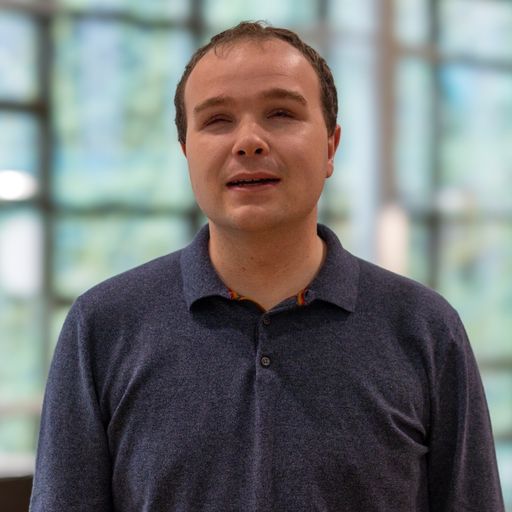
Peter Hayton
Doctoral Trainee
I am a visually impaired PhD student based in Open Lab at Newcastle University’s School of Computing. I have a strong interest in accessibility, with my research focusing on two key areas:
- The co-creation of intelligent systems, embedded into urban infrastructure, that can improve urban mobilities for visually impaired people (VIP).
- Critiquing the accessibility of human centred design (HCD) methods, from the perspective of a visually impaired researcher, to understand how future design methods may change to be made more accessible.
My PhD research sits primarily within the field of accessibility but is aligned with the area of disability justice to create more equitable futures, by bringing visually impaired perspectives at all levels, from participants in studies to determining the methods used. From the perspective of urban mobility, this research focuses on how intelligent systems embedded into the urban fabric can resolve many challenges faced by VIP today that prevent them from taking journeys confidently, where many solutions today cause VIP to rely on a plethora of smartphone apps to complete a journey, but where access to smartphones can be a limiting factor, this research explores how systems embedded into urban environments might better meet the needs of VIP.
Autonomous vehicles have been explored by this research as a possible solution to mobility challenges, where they could provide door-to-door transport for VIP. However, broader ethical questions around the role and trust of autonomous vehicles in society led to broader questions around the role of independence and what VIP need to take journeys confidently, where this research is addressing broader questions around mobility and infrastructures, including access to pavements and vehicles. To accomplish these goals, this research is exploring co-creation with a mix of participants, including both VIP and professionals involved in shaping urban environments, allowing for broader conversations on access to urban spaces to take place.
I am engaged in the process of creating an auto-ethnographic account of my experiences conducting research. I am also involved in projects regarding the accessibility of research methods from HCI researchers. One such project included my co-authoring the “Access InContext” workshop, exploring how prototyping tools can be made more accessible for HCI researchers.
Whilst researching for my PhD, I also work as a Postgraduate Teaching Assistant within Newcastle University’s School of Computing. As part of this role, I am a lecturer on the CSC8018 Web Technologies module for MSc Computer Science students, where I teach web standards, accessibility and validation of HTML and CSS pages. Additionally, I assist with other teaching duties for both undergraduate and postgraduate students within the school, including modules on Java.
Prior to returning to Newcastle University, I worked for a national sight loss charity in the UK. This work involved assisting visually impaired students to make their education at school and university accessible. My role also involved the design work for the charity’s new Vital Tech website. This included producing a low fidelity prototype to present to blind colleagues that conformed to WCAG 2.1 AA standards and producing digital content, exploring how mainstream technology can make the world a more accessible place for those living with visual impairments.
I hold a BSc in Computer Science from Newcastle University. This combined with my visual impairment has taught me the importance of accessibility throughout the development process, from enhanced user experiences to improved specification and code structuring.
Outside the lab, I have a keen interest in travel and love the opportunity to explore new places whenever I can. My research directly links with my love of travel, and it is my belief that one day, VIP will be able to confidently explore new places without being held back by inaccessible technologies and possibly one day tour the world in their fully autonomous cars.
2025
Access InContext: Futuring Accessible Prototyping Tools and Methods
2025 – Proceedings of the Extended Abstracts of the CHI Conference on Human Factors in Computing Systems